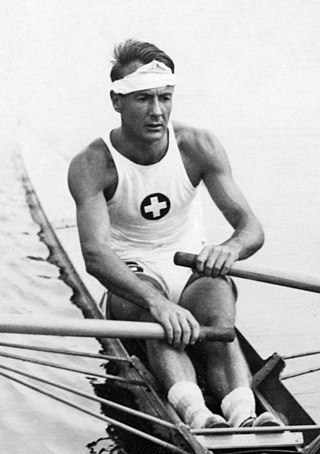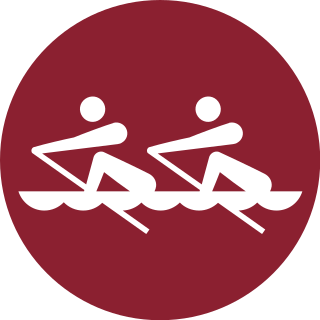
Mongolia competed at the 2004 Summer Olympics in Athens, Greece, from 13 to 29 August 2004. This was the nation's tenth appearance at the Olympics, except the 1984 Summer Olympics in Los Angeles, because of its partial support to the Soviet boycott.

Rowing at the Summer Olympics has been part of the competition since its debut in the 1900 Summer Olympics. Rowing was on the program at the 1896 Summer Olympics but was cancelled due to bad weather. Only men were allowed to compete until the women's events were introduced at the 1976 Summer Olympics in Montreal which gave national federations the incentive to support women's events and catalysed growth in women's rowing. Lightweight rowing events were introduced to the games in 1996. Qualifying for the rowing events is under the jurisdiction of the World Rowing Federation. World Rowing predates the modern Olympics and was the first international sport federation to join the modern Olympic movement.

The 2009 World Games the eighth edition of the World Games, were an international multi-sport event held in Kaohsiung, Taiwan from 16 July 2009 to 26 July 2009. The games featured sports that are not contested in the Olympic Games.

The men's coxed pair event was a rowing event conducted as part of the 1964 Summer Olympics programme. It was held from 11 to 15 October. There were 16 boats from 16 nations, with each nation limited to a single boat in the event. The event was won by American crew Edward Ferry, Conn Findlay, and coxswain Kent Mitchell. Findlay had been on the United States gold medal crew in 1956 and bronze medal crew in 1960; he was the first man to earn two gold medals in the event, as well as the first man to win three medals of any color in the event. Mitchell had also been on the 1960 crew, and was the seventh man to earn multiple medals in the coxed pair. Jacques Morel, Georges Morel, and cox Jean-Claude Darouy took silver to earn France's first medal in the event since 1952. Herman Rouwé, Erik Hartsuiker, Jan Just Bos earned what was formally the Netherlands' first medal in the event; a pair of Dutch rowers had won the first edition in 1900, but had jettisoned their cox in favor of a local French boy between rounds and thus that medal was a "mixed team" medal.

The men's coxed four event was part of the rowing programme at the 1920 Summer Olympics. The competition was held on 28 and 29 August 1920. It was the third appearance of the event, which had previously been held inaugural rowing competitions in 1900 as well as in 1912. Eight boats, each from a different nation, competed. The medals all went to nations that had not won a medal in the men's coxed four previously: Switzerland and the United States took gold and silver, respectively, in their debuts in the event; Norway took bronze.

The medal table of the 2008 Summer Paralympics ranks the participating National Paralympic Committees (NPCs) by the number of gold medals won by their athletes during the competition. The 2008 Paralympics was the thirteenth Games to be held, a quadrennial competition open to athletes with physical and intellectual disabilities. The games were held in Beijing, People's Republic of China, from 6 September to 17 September 2008.

The men's coxed pair event was part of the rowing programme at the 1924 Summer Olympics. The competition, the third appearance of the event, was held from 14 to 17 July 1924 on the river Seine. Five teams, each from a different nation, competed, for a total of 15 rowers and coxswains. The event was won by Switzerland, with rowers Édouard Candeveau and Alfred Felber and coxswain Émile Lachapelle. The two Swiss rowers had earned bronze in 1920 with a different cox. Defending champion Italian rowers Ercole Olgeni and Giovanni Scatturin took silver, this time with Gino Sopracordevole as their cox. Candeveau, Felber, Olgeni, and Scatturin were the first four men with multiple medals in the event. The United States' debut in the event netted a bronze medal for rowers Leon Butler and Harold Wilson and cox Edward Jennings.
Thomas Lee Stalker is an English professional boxer who challenged for the Commonwealth lightweight title in 2017. He won multiple international medals while competing for England as an amateur, including gold at the 2010 Commonwealth Games and bronze at the 2011 World Championships.

The men's coxed pair competition at the 1932 Summer Olympics in Los Angeles took place are at Long Beach Marine Stadium on 13 August. Competition consisted of a single round. There were 4 boats from 4 nations, with each nation limited to a single boat in the event. The event was won by the United States, its first victory in the event. Coxswain Edward Jennings had also been on the bronze medal team in 1924, making him the fifth man with multiple medals in the coxed pair. The American rowers were Charles Kieffer and Joseph Schauers. Silver went to Poland, in its coxed pair debut. France earned bronze.

The rowing competitions at the 2020 Summer Olympics in Tokyo took place between 23 and 30 July 2021 at the Sea Forest Waterway in Tokyo Bay. Fourteen medal events were contested by 526 athletes.

Mongolia competed at the 2016 Summer Olympics in Rio de Janeiro, Brazil, from 5 to 21 August 2016. Since the nation made its debut in 1964, Mongolian athletes had appeared in every edition of the Summer Olympic Games, with the exception of the 1984 Summer Olympics in Los Angeles, because of its partial support to the Soviet boycott.

The men's coxed pair rowing competition at the 1980 Summer Olympics took place at Krylatskoye Sports Complex Canoeing and Rowing Basin, Moscow, Soviet Union. The event was held from 20 to 27 July. There were 11 boats from 11 nations, with each nation limited to a single boat in the event. The event was won by Harald Jährling, Friedrich-Wilhelm Ulrich, and coxswain Georg Spohr of East Germany, the first men to successfully repeat as Olympic champions in the event. It was also the first time that a crew of the same three men earned multiple medals of any colour. East Germany's three straight medals matched the United States for most among nations to that point. Silver went to the Soviet Union again, though with an entirely different team from its 1976 runner-up crew; the silver medalists this time were Viktor Pereverzev, Gennadi Kryuçkin, and cox Aleksandr Lukyanov. Duško Mrduljaš, Zlatko Celent, and cox Josip Reić earned Yugoslavia's first medal in the event with their bronze.

The men's coxed four rowing competition at the 1980 Summer Olympics took place at Krylatskoye Sports Complex Canoeing and Rowing Basin, Moscow, Soviet Union. The event was held from 20 to 27 July. There were 12 boats from 12 nations, with each nation limited to a single boat in the event. The event was won by East Germany, the nation's first victory after three consecutive silver medals since it began competing separately in 1968. Defending champions the Soviet Union finished second, while Poland's bronze medal was the first medal in the men's coxed four for that nation since 1932. Twin brothers Ullrich and Walter Dießner became the sixth and seventh men to earn two medals in the event, as they had also competed on the 1976 East German silver medal team.

An Chang-rim is a South Korean retired judoka.

The men's coxed four competition at the 1936 Summer Olympics in Berlin took place are at Grünau on the Langer See. It was held from 12 to 14 August. There were 16 boats from 16 nations, with each nation limited to a single boat in the event. The event was won by Germany, the second time the nation had won two consecutive gold medals in the men's coxed four. Germany's four gold medals overall was the most any nation won in the event before it was discontinued; four nations won two. Switzerland, which had won three straight medals in the 1920s before not competing in 1932, returned to the podium with a silver medal. Bronze went to France, the nation's first medal in the event since 1924. Both Italy and Poland had two-Games medal streaks broken.

The men's coxed four (M4+) competition at the 1976 Summer Olympics took place at the rowing basin on Notre Dame Island in Montreal, Quebec, Canada. It was held from 18 to 25 July and was won by the team from Soviet Union. There were 14 boats from 14 nations, with each nation limited to a single boat in the event. The victory was the Soviet Union's first medal in the men's coxed four. East Germany took its third consecutive silver medal, with entirely different crews each time. The defending champion West Germany received bronze this time. Hans-Johann Färber, the only rower from the 1972 gold medal team to return, became the fifth man to earn multiple medals in the event.

The men's coxed pair competition at the 1992 Summer Olympics took place at Lake of Banyoles, Spain. It was held from 28 July to 2 August. There were 16 boats from 16 nations, with each nation limited to one boat in the event. The event was won by brothers Greg and Jonny Searle and coxswain Garry Herbert of Great Britain, the nation's first victory in the event. It was the third consecutive Games with brothers winning as the rowers; Italy's Carmine Abbagnale and Giuseppe Abbagnale had won in 1984 and 1988. They, along with longtime cox Giuseppe Di Capua, took silver this year, becoming the only crew to win three medals together in the event. Bronze went to Romanians Dimitrie Popescu, Nicolae Țaga, and cox Dumitru Răducanu. Popescu and Răducanu had been on the 1984 silver medal team, making them the 16th and 17th—and final—men to earn multiple medals in the event.

The men's coxed four competition at the 1992 Summer Olympics took place at took place at Lake of Banyoles, Spain. It was held from 27 July to 1 August. There were 12 boats from 12 nations, with each nation limited to a single boat in the event. The event was won by Romania, the nation's first victory in the event; the Romanian team had taken silver in 1988. Germany, recently re-united, took silver in 1992; East Germany had won gold in 1988. Two men returned from the 1988 podium to medal again in 1992: Dimitrie Popescu of Romania and Hendrik Reiher of the former East German team. They were the eighth and ninth men to earn multiple medals in the event; due to the removal of the men's coxed four from the programme, they would be the last. Bronze went to Poland, the nation's fourth bronze medal in the coxed four.

The team of the Olympic Federation of Ireland, which competed at the 2020 Summer Olympics in Tokyo, represented athletes from both the Republic of Ireland and those from Northern Ireland who choose it instead of the Great Britain and Northern Ireland team. Originally scheduled to take place from 24 July to 9 August 2020, the Games were postponed to 23 July to 8 August 2021, due to the COVID-19 pandemic. It was the team's twenty-second appearance at the Summer Olympics, having attended every edition since 1924 except the 1936 Summer Olympics in Germany.

Mongolia competed at the 2020 Summer Olympics in Tokyo. Originally scheduled to take place from 24 July to 9 August 2020, the Games were postponed to 23 July to 8 August 2021, because of the COVID-19 pandemic. Since the nation's debut in 1964, Mongolian athletes have appeared in every edition of the Summer Olympic Games, with the exception of the 1984 Summer Olympics in Los Angeles, because of its support of the Soviet boycott.
















